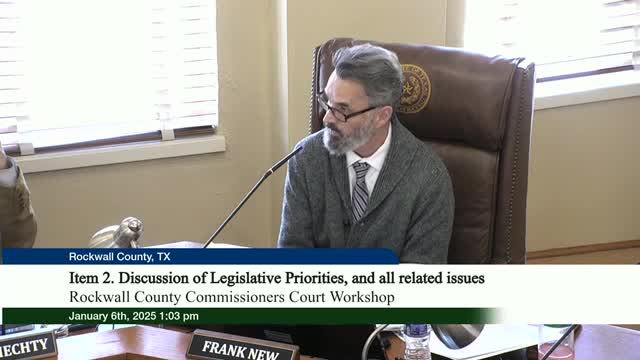Rockwall County officials press for MUD reform and stronger local control in Austin
Get AI-powered insights, summaries, and transcripts
Subscribe
Summary
At a Jan. 6 Rockwall County workshop, county leaders and area mayors identified municipal utility district (MUD) reform and 'local decision making' as top legislative priorities, urging coordinated action in the 2025 Texas legislative session and describing specific policy goals they want amended in bills already filed.
County Judge called MUD reform a top priority and said the county is “the canary in the coal mine” if new MUDs form without adequate oversight. He told other commissioners and area mayors on Jan. 6 that changes are needed to protect schools, water, drainage and long‑term infrastructure in Rockwall County.
The court and invited city mayors discussed a set of proposed changes to state law to increase transparency, require coordination with local governments and recover the cost of providing services to new MUDs. Mayor David Billings of Fate, who said the city is drafting bills, outlined six proposals that he said address existing MUDs and strengthen oversight: tougher TCEQ checklist requirements; mandatory municipal and county notifications or approvals in some cases; statutory authority for some city impact and EMS fees; meeting locations within taxing jurisdictions; voter approval for secondary debt; and clearer mechanisms for recovering city services costs tied to MUDs. “We’re writing the bills right now,” Billings said.
Commissioners and mayors debated how far to press in Austin. Several officials said they favor “proportionality” or assessments to ensure developments pay for the services they require, but they were divided on adopting the formal structure known as impact fees. Commissioner Bobby Stacy said he opposed traditional impact‑fee structures for counties (which require five‑year plans and engineering studies) but supported a proportionality approach based on the specific service needs created by a new development. The county judge and others said they want statutory authority to recover long‑term capital costs — for example, the cost of hiring officers and buying vehicles — not just the immediate cost of a single EMS call.
Participants reviewed bills already filed and plans to engage state lawmakers. The group discussed Senate Bill 102 (referred to in the workshop materials) and characterized it as stopping short of meaningful reform; participants suggested it be moved from an “oppose” list to “needs work” so county negotiators could try to amend it. Commissioners described a strategy to bring a coordinated message to Austin: produce a redlined draft for state representatives and senators, build a county‑city coalition, prepare summaries of public comment from the county’s strategic planning process, and convene a Rockwall delegation to testify at committee hearings.
No formal action or vote was taken at the workshop. Court members directed staff to draft county resolutions that reflect the court’s priorities, to coordinate with the cities on a unified legislative ask, and to return with recommended resolutions at the court’s next regular meeting.
Officials repeatedly emphasized the practical stakes. “We’re 4 or 5 developments away from being done,” the county judge said. Several speakers urged a focused, coordinated push that would combine draft legislation, grassroots outreach and targeted visits to lawmakers’ offices once committee assignments and calendars are set.
